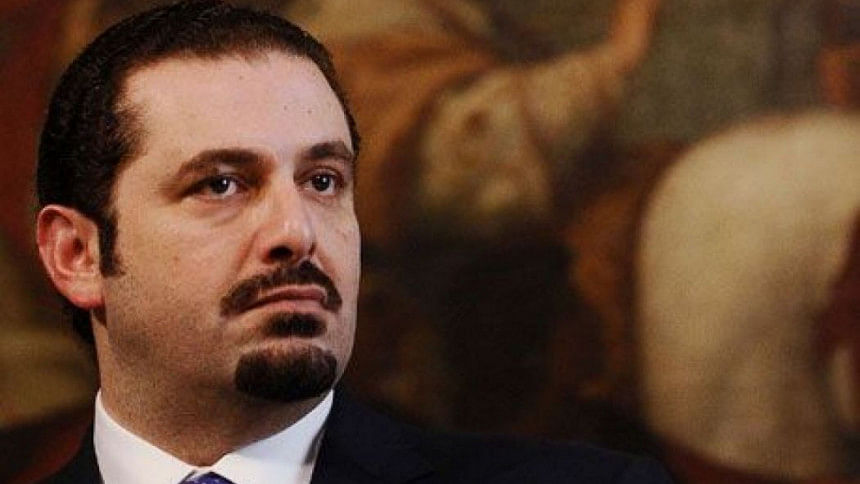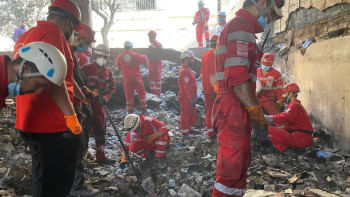Hariri's bombshell resignation

Lebanese President Michel Aoun has not formally accepted Saad al-Hariri's (who also holds Saudi citizenship) sudden resignation which was televised from Riyadh recently. Indeed, the "resignation" of ex-PM Saad al-Hariri while on official visit to the Kingdom of Saudi Arabia (KSA) has been touted by the Lebanese president as a kidnapping. Hariri's broadcast on November 4 is widely suspected in Lebanese political circles to have been made under duress and as stated by Aoun, "does not reflect reality". Indeed, the president went on to state that whatever Hariri says now "is the result of the dubious and mysterious situation that he is living in the kingdom."
We live in interesting times to say the least. Last week Hariri launched a tirade against Iran and its principal ally, Hezbollah, for trying to destabilise the region. Hezbollah for its part has rallied round Hariri stating that Hariri was being "detained in Saudi Arabia" and "banned from returning to Lebanon". The Hariri incident, if we may call it that, has brought together Lebanon's diverse political landscape behind Hariri. The situation in the country remains tense. But the bigger picture of course is elsewhere.
The game being played out today has everything to do with the epic struggle between Sunni and Shia Islam. For years, KSA has watched Iran's growing influence from the sidelines. It has watched Hezbollah's ascendance as not just another militia in Lebanon, but one with brawn that has taken on the military might of Israel, all the way to Iran's dominance in the Syrian conflict. Today, Iran is consulted by great powers like Russia on the future of Syria in a post-ISIS scenario.
There is a new crown prince in town. He means business. The recent shake-up netted some of the biggest and most prominent names in the Saudi establishment and has thrown the KSA into the world spotlight. Here is a man who is willing to break with the past and forge a new beginning for his kingdom. His policies, both domestic and international, are bold. Crown Prince Mohammad bin Salman is not afraid to take off his gloves. The campaign in Yemen is a mixed bag of challenges and opportunities (depending on who one talks to), but precisely what can be gained by the Hariri experience is unclear. Hariri's sudden resignation and equally sudden change of heart is perhaps not exactly the sort of response KSA policymakers were prepared for.
While many in the Sunni heartland may be beaming at the statements coming out of Washington regarding the US-Iran nuclear treaty, the prospect of the re-imposition of UN sanctions on that country remains a far cry. What is clear however is that the pendulum-like actions of Hariri in recent weeks tell us that not everything is going as had been envisaged and that attempts at "regime change" do not always bring the desired dividends.
Lebanon remains divided along Sunni-Shia lines. The Hariri-Sunni camp is deemed pro-Saudi whilst Aoun is squarely allied with Hezbollah and, ultimately, Tehran. Regardless of what other countries in the region want, the Lebanese do not want instability. Having lived through decades of civil war, one can understand why peaceful co-existence is so appealing to the Lebanese people.
That said, the prominence of Hezbollah, a group that operates largely above Lebanese law, has been an actor on the ground, fighting alongside Assad's forces throughout the Syrian conflict. Hezbollah does not answer to anyone except Tehran and it certainly does not answer to Hariri. The Lebanese president has stated on record that he is waiting for Hariri to return to Lebanon to explain his actions give the Lebanese people hope. That the Shiite and Sunni policymakers are willing to set aside their differences for the time being to forge national unity in the face of external pressures is a reassuring sign for its citizens.
As for the KSA, should the crown prince be able to ride out the storm he has brewed, we can look forward to a much more aggressive Saudi foreign policy. Contrary to popular opinion, the Syrian conflict is anything but done. With the removal of the Kurds, the Shiite militias are very emboldened. It will be interesting to see whether Assad grants Iran's wish i.e. whether Iranian-backed militias are allowed to set up base in the country. And we must not forget the State of Israel, which, according to media reports, has unilaterally launched several cross-border raids into Syria that include assassinations and assaults on "arms catches" belonging to Hezbollah.
Lebanon under the current leadership has managed to steer clear of the Syrian civil war despite Hebollah's involvement there. A destabilised Lebanon will bode ill for everyone including the Lebanese themselves. It is a country where power-sharing has become the norm and its leaders, both Shiite and Sunni, would be wise to preserve the peace despite goading from abroad.
Syed Mansur Hashim is Assistant Editor, The Daily Star.





Comments